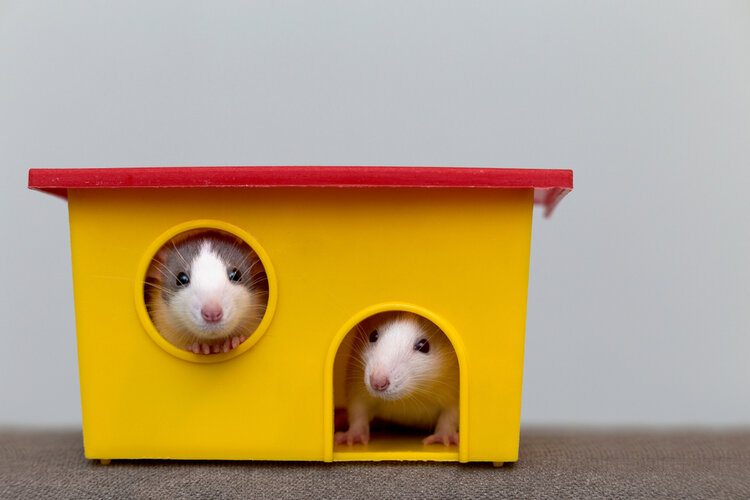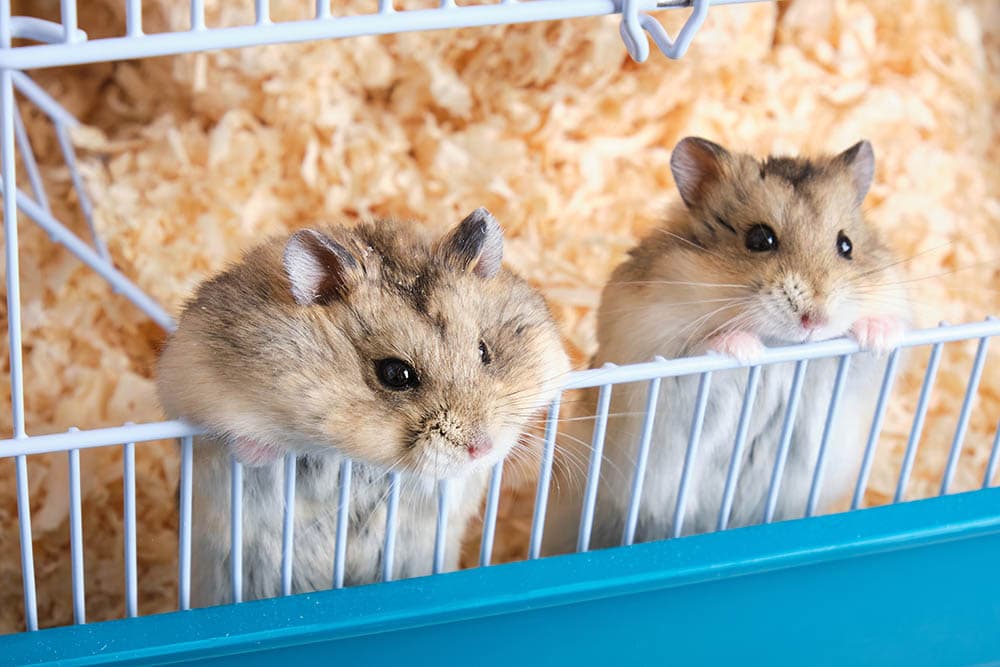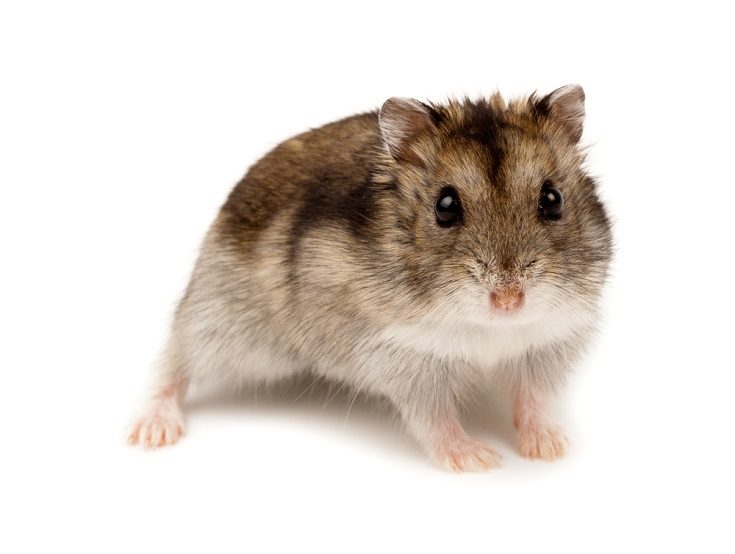
| Length: | 3.5 – 4 inches |
| Weight: | 0.5 – 1.5 ounces |
| Lifespan: | 1 – 3 years |
| Colors: | Ash gray to dark brown with stripes |
| Temperament: | Easy to tame, sociable |
| Best Suited For: | First-time hamster owners, families without small children |
If you’re looking for a hamster with the size and sociability of a Campbell’s Russian and the personality and temperament of a Syrian hamster, then you’re in luck. The Dwarf Winter White hamster is perfect for you.
These little critters are the best of both worlds when it comes to hamsters. They’re easy and docile like Syrian hamsters, but they’re not nearly as territorial. And they do well with other hamsters like the Campbell’s Russian, but without the extra time needed to tame them.
And with its seasonal changing coat, the Dwarf Winter White Russian hamster really is like getting two hamsters in one!
Dwarf Winter White Hamsters – Before You Bring One Home…
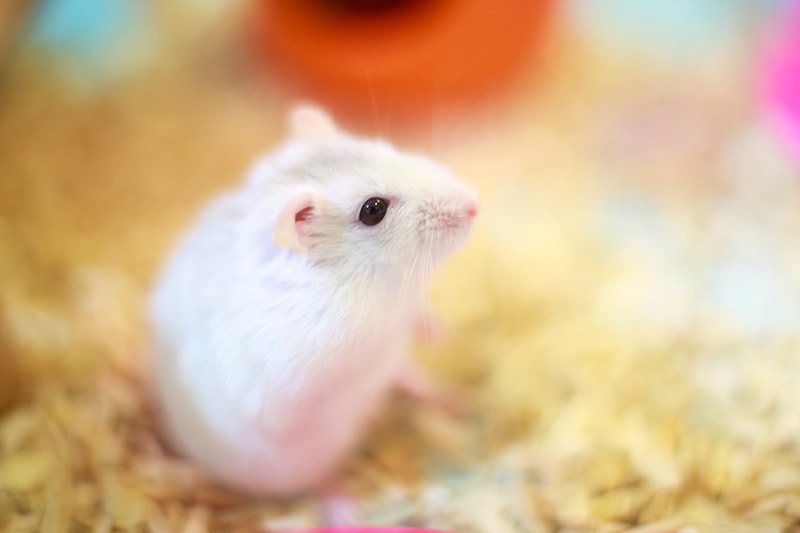
Are you looking for a Dwarf Winter White hamster but are having difficulty finding one? You may have actually already run across quite a few without even knowing it! Winter Whites actually have no fully accepted common name. They are referred to by many different names including Russian dwarf hamsters, Siberian hamsters, and Djungarian hamsters. And to make matters even more confusing, Campbell’s Russian hamsters are also commonly called Russian dwarf hamsters and Djungarians.
This can make things really tough when searching for a purebred Winter White. Your best bet is to contact a certified hamster breeder. These folks usually know their stuff and can get you pointed in the right direction.
What’s the Price of Dwarf Winter White Russian Hamsters?
Hamsters are among the cheapest pets that you can find. You’ll be able to pick up a single Dwarf Winter White Russian hamster between $5-15 and a pair for $15-20. It all really depends on how rare it is to see this breed in your area.
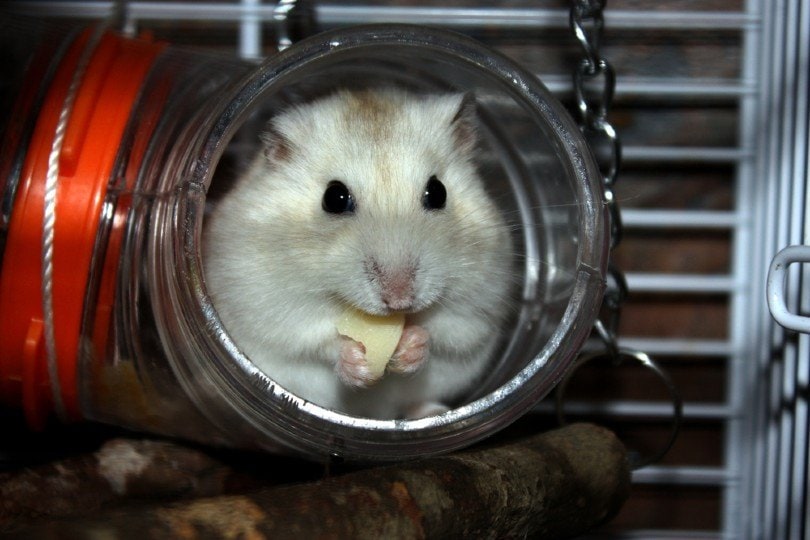
3 Little-Known Facts About Dwarf Winter White Russian Hamsters
1. True Winter White Hamsters Can Be Hard to Find
These hamsters can actually seem relatively rare, that’s because of two reasons:
2. Their Coat Changes Color Depending On the Season
One of the aspects that makes Winter White hamsters so special is that their coat actually changes color with the seasons. This is because, in the wild, their white coating offers them camouflage from predators against the snow. They have the exact same ability to do so in captivity, however, that guarantee it will happen. If your hamster is housed where it is not exposed to seasonal light, it probably will not change colors.
3. They Can Breed Year-Round
Winter White hamsters do not have a breeding season. Females enter heat every four days! And that’s not all. They can also get pregnant again on the same day they give birth. If you have a male and a female, you need to be very careful lest you find yourself swarmed with baby hamsters.
Temperament & Intelligence of the Dwarf Winter White Hamster
These hamsters are so chock full of personality and they’re some of the most vocal hamsters around. You’ll often hear them squeaking “angrily” at one another and causing a ruckus. However, that’s doesn’t mean they’re necessarily mad. That’s just their way of communication. But if you hear prolonged squeaks or ones that are more pronounced, then check in on them. This could be a sign of bullying.
Winter Whites are also known to be the big babies of the hamster world. They’ll noisily complain over some of the smallest issues. But it’s all just part of their unique personality.
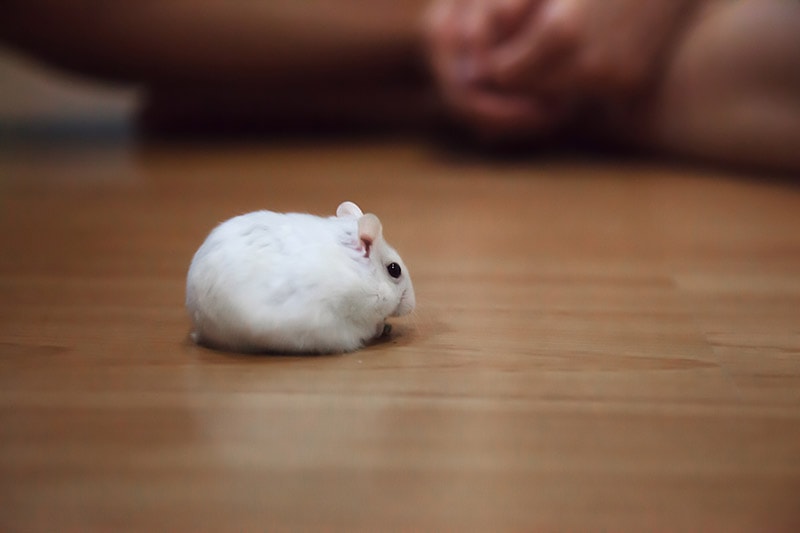
Are These Hamsters Good for Families? 👪
These hamsters are very good for families with older kids. They are much more docile than other dwarf hamsters and don’t nip as much. You’ll just need to take the time to properly tame it. Thankfully, they tame pretty quick. Younger children who have been exposed to hamster care could also do well with Winter Whites. We just wouldn’t recommend it for their first hamster.
Does This Breed Get Along with Other Pets?
Hamsters need to stay separated from other animals. However, you can still keep them in the same household provided you do separate them.
When it comes to living with other Winter White hamsters, absolutely! They’re a very social breed of hamster and actually do better when paired up. The real trick is making sure that the hamsters get along. The best way to do this is to put them together while they are young, even as early as five weeks.
You’ll still see one of them take a more dominant role, but they shouldn’t be fighting to the death.
Things to Know When Owning a Dwarf Winter White Hamster:
Owning Dwarf Winter White Russian hamsters can be a really fun experience. And they’re super easy to care for too, as long as you understand a few key things.
Food & Diet Requirements 🥕
When it comes to properly feeding your hamster, you should opt for specialized hamster pellets. These are designed with hamsters in mind. It’s difficult to measure out the small amounts of each vitamin and mineral that your hamster needs, and pellets ensure that your hamster stays fit. However, you can give your Winter White some nice little snacks and treats such as whole grains and seeds.
Just be sure to avoid foods such as raw beans, raw potatoes, almonds, onion, and garlic. Garlic is particularly poisonous to hamsters.

Exercise 🐹
Winter White hamsters are extremely active and social critters. They just love to run and play, especially with each other. If you do end up getting a pair, make sure that their enclosure is large enough to accompany both. You’ll also want to get each of them their own exercise wheels and toys to prevent any squabbles.
Despite their active playfulness, you want to avoid multi-story cages and tubular module habitats. These hamsters enjoy wide-open spaces that they can run in. Just make sure they have plenty of bedding material for their burrowing enjoyment.
Training 🎾
When it comes to training a Winter White hamster, it’s similar to “training” other hamsters. They’re not necessarily trained, but more tamed. In this respect, this particular breed is much easier to tame than other dwarf hamsters. They are much more docile like their Syrian hamster cousins.
They do need to be handled gently and slowly, or else they could nip you. But once they become familiar with their owners, Winter White hamsters just love being pet and snuggled.
Grooming ✂️
Hamsters are among the easiest animals to groom since they take care of themselves. You’ll find your Winter Whites constantly trying to keep themselves clean. However, that’s not to say you can’t give them a nice massage with a soft-bristled brush. They’re sure to enjoy that!
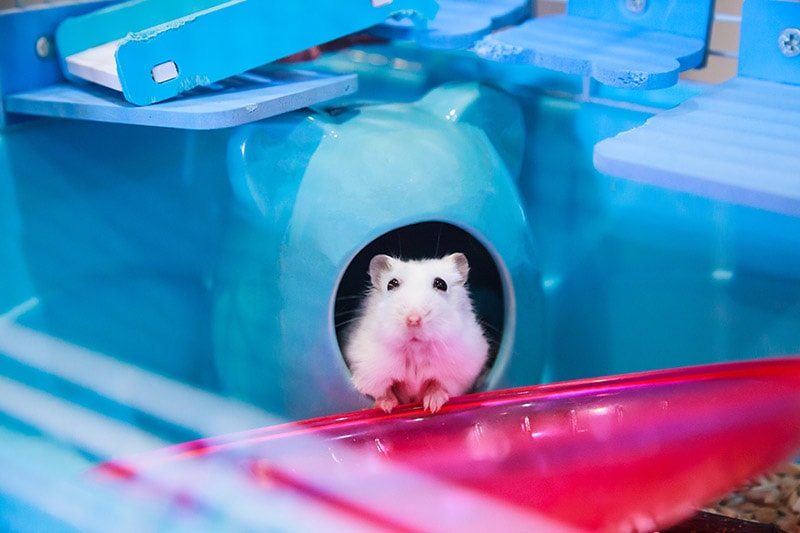
Health and Conditions 🏥
The Dwarf Winter White hamster is a little bit heartier than some of its other Dwarf hamster cousins. For example, experts agree that they are less susceptible to diabetes, unlike the Campbell’s Russian. But that doesn’t mean Winter Whites don’t have their fair share of illnesses.
Hamsters are particularly susceptible to tumors. Report any noticeable lumps right away.
All types of hamsters, including the Dwarf Winter Whites, can suffer from a bacterial infection of the small intestine and GI tract called wet tail. This can lead to severe diarrhea, watery discharges, and death. If you notice your hamster’s tail area becoming very wet and muddied, notify your vet immediately.
Because these hamsters are so small, falls from even the slightest of heights can have big consequences. This is why we recommend not letting small children handle them. Winter Whites can be skittish and can easily escape smaller hands.
Lastly, mites are common in all hamsters. Fortunately, they’re super easy to treat. Usually, you just need to apply a special topical ointment, cream, or dust.
Male vs Female
There are very few size differences between male and female Winter Whites — with the males being only slightly larger. The biggest difference between the two is seen in same-sex colonies. The males tend to be much more tolerant of each other, while the females have more petty squabbles.
Final Thoughts
The Dwarf Winter White Russian hamster is a great choice for those of you out there looking to get into caring for dwarf hamsters. They’re more docile than other breeds and easier to tame. They also have fewer health issues than many other dwarf hamsters. And their social nature makes them great, lovable small pets as well.
Featured Image Credit: Vishnevskiy Vasily, Shutterstock





